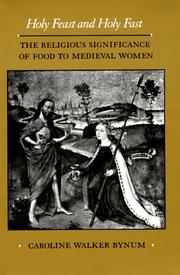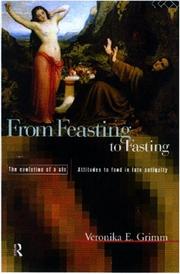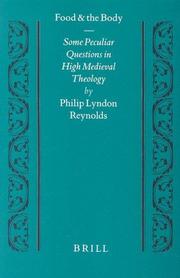| Listing 1 - 6 of 6 |
Sort by
|
Book
ISBN: 2362792234 9782362792236 Year: 2017 Publisher: Paris: Alma,
Abstract | Keywords | Export | Availability | Bookmark
 Loading...
Loading...Choose an application
- Reference Manager
- EndNote
- RefWorks (Direct export to RefWorks)
Il n'existe pas un régime alimentaire chrétien. Selon la tradition des apôtres, peu importe ce que l'on mange. Ce qui compte c'est la manière dont on le fait. Au commencement, le Christ des Évangiles est tributaire des normes alimentaires juives. Mais un songe de Pierre, dans les Actes des apôtres, libère de ces interdits la communauté chrétienne naissante. Les hommes cependant ont besoin de règles. Le christianisme, au cours des siècles, va donc élaborer une série infinie de modèles alimentaires hérités de la tradition juive, de la philosophie grecque et de la science de l'alimentation : rôle du pain et du vin dans l'Eucharistie ; relation à la viande, au sang et au gras ; valeur de rachat du jeûne ; modes culinaires, y compris monastiques ; règles d'abstinence... Publié en 2015 en Italie, l'essai de Massimo Montanari aborde ces questions complexes avec une remarquable simplicité. Son autorité scientifique l'exonère des démonstrations pesantes et lui permet d'offrir au lecteur une intelligence profonde du sujet. Un sujet... d'actualité. Que l'on considère le véganisme ou le végétarisme, l'extension du marché halal ou les banquets de saucisson, hier marqueurs d'anticléricalisme en période de Carême, aujourd'hui destinés à discriminer d'autres religions. On le voit, l'alimentation n'est pas qu'affaire de goût.
Coutumes alimentaires --- Alimentation --- Histoire. --- Aspect religieux --- Christianisme. --- Histoire --- Christianisme --- Food habits --- Nutrition --- Habitudes alimentaires --- History --- Religious aspects --- Christianity --- Food --- Dinners and dining --- Fasting --- Food in the Bible --- Christianity. --- Food - Religious aspects - Christianity - History --- Dinners and dining - Religious aspects - Christianity - History --- Fasting - Religious aspects - Christianity - History --- Food habits - History
Book
ISBN: 9780231149976 9780231149969 9780231520799 0231149964 0231149972 0231520794 1281960985 9786613793171 Year: 2011 Publisher: New York: Columbia university press,
Abstract | Keywords | Export | Availability | Bookmark
 Loading...
Loading...Choose an application
- Reference Manager
- EndNote
- RefWorks (Direct export to RefWorks)
Without a uniform dietary code, Christians around the world used food in strikingly different ways, developing widely divergent practices that spread, nurtured, and strengthened their religious beliefs and communities. Featuring never-before published essays, this anthology follows the intersection of food and faith from the fourteenth to the twenty-first century, charting the complex relationship among religious eating habits and politics, culture, and social structure.Theoretically rich and full of engaging portraits, essays consider the rise of food buying and consumerism in the fourteenth century, the Reformation ideology of fasting and its resulting sanctions against sumptuous eating, the gender and racial politics of sacramental food production in colonial America, and the struggle to define "enlightened" Lenten dietary restrictions in early modern France. Essays on the nineteenth century explore the religious implications of wheat growing and breadmaking among New Zealand's Maori population and the revival of the Agape meal, or love feast, among American brethren in Christ Church. Twentieth-century topics include the metaphysical significance of vegetarianism, the function of diet in Greek Orthodoxy, American Christian weight loss programs, and the practice of silent eating rituals among English Benedictine monks. Two introductory essays detail the key themes tying these essays together and survey food's role in developing and disseminating the teachings of Christianity, not to mention providing a tangible experience of faith.
Christian religion --- Nutritionary hygiene. Diet --- Food --- -Food habits --- -Dinners and dining --- -392.8 --- 291.34 --- 265.3 --- 248.153.4 --- Banquets --- Dining --- Eating --- Meals --- Caterers and catering --- Entertaining --- Etiquette --- Cooking --- Gastronomy --- Menus --- Table --- Food customs --- Foodways --- Human beings --- Habit --- Manners and customs --- Diet --- Nutrition --- Oral habits --- Foods --- Dinners and dining --- Home economics --- Dietaries --- Religious aspects --- -Christianity --- -History. --- History. --- Culinaire gewoonten. Eetgewoonten. Drinkgewoonten. Vasten. Tafeletiquette. Maaltijden. Kannibalisme --- Indirecte beïnvloeding van de goddelijke wil: offergaven; dierenoffers; mensenoffers; dankoffers; rituele moorden; boetedoeningen --- Eucharistie --- Vasten. Versterving. Onthouding --- Food habits --- 248.153.4 Vasten. Versterving. Onthouding --- 265.3 Eucharistie --- 291.34 Indirecte beïnvloeding van de goddelijke wil: offergaven; dierenoffers; mensenoffers; dankoffers; rituele moorden; boetedoeningen --- 392.8 Culinaire gewoonten. Eetgewoonten. Drinkgewoonten. Vasten. Tafeletiquette. Maaltijden. Kannibalisme --- Christianity --- 392.8 --- Religious aspects&delete& --- Christianity&delete& --- History --- Primitive societies --- Food - Religious aspects - Christianity - History. --- Food habits - History. --- Dinners and dining - Religious aspects - Christianity - History.
Multi
ISBN: 9783161492716 3161492714 Year: 2008 Volume: 234 Publisher: Tübingen: Mohr Siebeck,
Abstract | Keywords | Export | Availability | Bookmark
 Loading...
Loading...Choose an application
- Reference Manager
- EndNote
- RefWorks (Direct export to RefWorks)
Bible NT --- Lord's Supper --- Dinners and dining --- Food --- Fellowship --- Eschatology --- Utopias --- History --- Biblical teaching --- Religious aspects --- Christianity --- History of doctrines --- 225.08*3 --- Theologie van het Nieuwe Testament: themata --- Theses --- 225.08*3 Theologie van het Nieuwe Testament: themata --- Ideal states --- States, Ideal --- Utopian literature --- Political science --- Socialism --- Voyages, Imaginary --- Dystopias --- Foods --- Home economics --- Table --- Cooking --- Diet --- Dietaries --- Gastronomy --- Nutrition --- Companionship --- Comradeship --- Friendship --- Banquets --- Dining --- Eating --- Meals --- Caterers and catering --- Entertaining --- Etiquette --- Menus --- Religious aspects&delete& --- Primitive societies --- Lord's Supper - History - Early church, ca 30-600 --- Dinners and dining - Biblical teaching --- Food - Religious aspects - Christianity - History of doctrines - Early church, ca 30-600 --- Fellowship - Religious aspects - Christianity - History of doctrines - Early church, ca 30-600 --- Eschatology - History of doctrines - Early church, ca 30-600 --- Utopias - Religious aspects - Christianity

ISBN: 0520057228 0520063295 128007891X 9786613520180 0520908783 0585326487 9780520908789 9780585326481 9780520057227 9780520063297 9781280078910 6613520187 Year: 1987 Volume: vol 1 Publisher: Berkeley : University of California Press,
Abstract | Keywords | Export | Availability | Bookmark
 Loading...
Loading...Choose an application
- Reference Manager
- EndNote
- RefWorks (Direct export to RefWorks)
In the period between 1200 and 1500 in western Europe, a number of religious women gained widespread veneration and even canonization as saints for their extraordinary devotion to the Christian eucharist, supernatural multiplications of food and drink, and miracles of bodily manipulation, including stigmata and inedia (living without eating). The occurrence of such phenomena sheds much light on the nature of medieval society and medieval religion. It also forms a chapter in the history of women. Previous scholars have occasionally noted the various phenomena in isolation from each other and have sometimes applied modern medical or psychological theories to them. Using materials based on saints' lives and the religious and mystical writings of medieval women and men, Caroline Walker Bynum uncovers the pattern lying behind these aspects of women's religiosity and behind the fascination men and women felt for such miracles and devotional practices. She argues that food lies at the heart of much of women's piety. Women renounced ordinary food through fasting in order to prepare for receiving extraordinary food in the eucharist. They also offered themselves as food in miracles of feeding and bodily manipulation. Providing both functionalist and phenomenological explanations, Bynum explores the ways in which food practices enabled women to exert control within the family and to define their religious vocations. She also describes what women meant by seeing their own bodies and God's body as food and what men meant when they too associated women with food and flesh. The author's interpretation of women's piety offers a new view of the nature of medieval asceticism and, drawing upon both anthropology and feminist theory, she illuminates the distinctive features of women's use of symbols. Rejecting presentist interpretations of women as exploited or masochistic, she shows the power and creativity of women's writing and women's lives.
Food --- Women --- Food habits --- Aliments --- Femmes --- Habitudes alimentaires --- Religious aspects --- Christianity --- History --- Aspect religieux --- Christianisme --- Histoire --- Social history --- Eglise catholique --- History of doctrines --- 248.153.4 --- 396 "04/14" --- -Social history --- -Food --- -Food habits --- -Eating --- Food customs --- Foodways --- Human beings --- Habit --- Manners and customs --- Diet --- Nutrition --- Oral habits --- Foods --- Dinners and dining --- Home economics --- Table --- Cooking --- Dietaries --- Gastronomy --- Descriptive sociology --- Social conditions --- Sociology --- Human females --- Wimmin --- Woman --- Womon --- Womyn --- Females --- Femininity --- Vasten. Versterving. Onthouding --- Feminisme. Vrouwenbeweging. Vrouw en maatschappij--Middeleeuwen --- -Religious aspects --- -Christianity --- -History of doctrines --- -History --- -Vasten. Versterving. Onthouding --- 396 "04/14" Feminisme. Vrouwenbeweging. Vrouw en maatschappij--Middeleeuwen --- 248.153.4 Vasten. Versterving. Onthouding --- Christianity. --- -248.153.4 Vasten. Versterving. Onthouding --- Eating --- History of civilization --- Christian spirituality --- anno 1200-1499 --- Middle Ages, 500-1500 --- Primitive societies --- Food - Religious aspects - Christianity --- Women - History - Middle Ages, 500-1500 --- Food habits - History --- Aliments - Aspect religieux - Eglise catholique --- Femmes - Histoire - 500-1500 (Moyen Age) --- Habitudes alimentaires - Histoire --- Food - Religious aspects - Christianity - History of doctrines - Middle Ages, 600-1500 --- Social history - Medieval, 500-1500 --- Food habits - History - To 1500 --- anthropology. --- catholicism. --- devotional practices. --- eucharist. --- fasting. --- feminism. --- feminist theory. --- food studies. --- food. --- gender studies. --- gender. --- historiography. --- history. --- inedia. --- medieval asceticism. --- medieval religion. --- medieval society. --- medieval women. --- middle ages. --- miracles. --- mysticism. --- nonfiction. --- piety. --- religion. --- religiosity. --- religious studies. --- religious vocation. --- religious women. --- renunciation. --- saints lives. --- saints. --- stigmata. --- symbolism. --- western europe. --- women and religion. --- womens lives. --- womens studies. --- womens writing. --- world history. --- MEDIEVAL CIVILIZATION --- WOMEN --- HABITUDES ALIMENTAIRES --- HISTORY --- MIDDLE AGES, 500-1500 --- MOYEN AGE

ISBN: 0415135958 9780415135955 Year: 1996 Publisher: London: Routledge,
Abstract | Keywords | Export | Availability | Bookmark
 Loading...
Loading...Choose an application
- Reference Manager
- EndNote
- RefWorks (Direct export to RefWorks)
Aliments dans la Bible --- Food in the Bible --- Voedsel in de Bijbel --- Food --- Food habits --- Fasting --- Aliments dans la bible --- Aliments --- Habitudes alimentaires --- Jeûne --- Religious aspects --- History. --- Biblical teaching. --- Aspect religieux --- Histoire --- Enseignement biblique --- Food in the Bible. --- Christianity --- History of doctrines --- Bible. --- Criticism, interpretation, etc. --- 248.153.4 --- -Fasting --- -Food --- -Food habits --- -Food in the Bible --- Eating --- Food customs --- Foodways --- Human beings --- Habit --- Manners and customs --- Diet --- Nutrition --- Oral habits --- Foods --- Dinners and dining --- Home economics --- Table --- Cooking --- Dietaries --- Gastronomy --- Abstinence --- Asceticism --- Penance --- Hunger --- Starvation --- Vasten. Versterving. Onthouding --- Biblical teaching --- History --- -Christianity --- -History of doctrines --- -History --- 248.153.4 Vasten. Versterving. Onthouding --- Jeûne --- Ba-yon Tipan --- Bagong Tipan --- Jaji ma Hungi --- Kainē Diathēkē --- New Testament --- Nouveau Testament --- Novo Testamento --- Novum Testamentum --- Novyĭ Zavet --- Novyĭ Zavi︠e︡t Gospoda nashego Īisusa Khrista --- Novyĭ Zavit --- Nuevo Testamento --- Nuovo Testamento --- Nye Testamente --- Perjanjian Baru --- Dhamma sacʻ kyamʻʺ --- Injīl --- Primitive and early church, ca. 30-600 A.D. --- Food - Religious aspects - Christianity - History of doctrines - Early church, ca. 30-600. --- Fasting - Biblical teaching. --- Fasting - History. --- Primitive societies --- Food habits - History.

ISSN: 01698125 ISBN: 9004115323 9004452915 9789004115323 9789004452916 Year: 1999 Volume: 69 Publisher: Leiden;Boston BRILL
Abstract | Keywords | Export | Availability | Bookmark
 Loading...
Loading...Choose an application
- Reference Manager
- EndNote
- RefWorks (Direct export to RefWorks)
Whether or not food passes into the truth of human nature" was among the questions that scholastic theologians routinely disputed. Many twelfth-century theologians, including Peter Lombard, argued that the "truth" of every human body came entirely from Adam, and that food stimulated its growth but was not incorporated into it. Parisian masters in the thirteenth-century rejected Lombard's position; some Oxford masters defended it, appealing to theories of light and prime matter. The first part of the book traces the origins of such questions in theology, medicine and natural philosophy. The second part analyzes their treatment and development in thirteenth-century theology. The study illumines theologians' opinions about reproduction, fetal development, growth, nutrition, digestion, aging, corporeal identity, matter, physical quantity, the resurrection, and the relationship between theology and the natural sciences.
Human body --- Theology --- Nutrition --- Religion and science --- Corps humain --- Théologie --- Alimentation --- Religion et sciences --- Religious aspects --- History --- Aspect religieux --- Histoire --- Body, Human --- Food --- Christianity --- History of doctrines --- 230.2 "04/14" --- -Body, Human --- -Food --- -Foods --- Dinners and dining --- Home economics --- Table --- Cooking --- Diet --- Dietaries --- Gastronomy --- Human beings --- Body image --- Human anatomy --- Human physiology --- Mind and body --- Health --- Physiology --- Dietetics --- Digestion --- Food habits --- Malnutrition --- Theologische scholen--(verder in te delen zoals 28)--Middeleeuwen --- -Christianity --- -History of doctrines --- -Religious aspects --- -Health aspects --- Health aspects --- -Theologische scholen--(verder in te delen zoals 28)--Middeleeuwen --- -230.2 "04/14" --- 230.2 "04/14" Theologische scholen--(verder in te delen zoals 28)--Middeleeuwen --- Théologie --- Foods --- Middle Ages, 600-1500 --- Middle Ages, 500-1500 --- Primitive societies --- Body, Human - Religious aspects - Christianity - History of doctrines - Middle Ages, 600-1500. --- Nutrition - Religious aspects - Christianity - History of doctrines - Middle Ages, 600-1500. --- Food - Religious aspects - Christianity - History of doctrines - Middle Ages, 600-1500. --- Religion --- Religion, Primitive --- Atheism --- Irreligion --- Religions --- Ecclesiastical history --- History, Church --- History, Ecclesiastical --- history
| Listing 1 - 6 of 6 |
Sort by
|

 Search
Search Feedback
Feedback About UniCat
About UniCat  Help
Help News
News